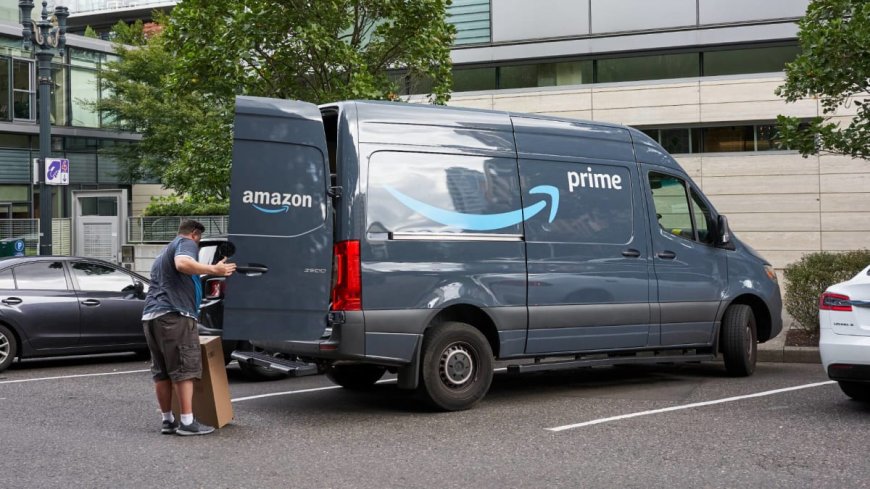Amazon Wants Your Local Coffee Shop to Do This; Here's Why That's a Bad Idea
The company is launching a program that it hopes will improve this key service

When it comes to last mile deliveries, retailers are getting more and more creative.
Walmart Stores Inc. (WMT) - Get Free Report the nation’s largest grocery chain, is leaning harder into partnership with the Spark Driver platform, an Uber-like service that allows independent drivers to deliver online orders from stores and warehouses to people’s homes. The retailer tripled its number of pickup points to 15,000 in fiscal year 2023 from 5,000 the prior year.
Target Corporation (TGT) - Get Free Report is testing what it calls Target Last Mile Target Delivery (TLMD) extension in the Atlanta market. The company has built a low cost, no frills sortation center located in Smyrna, Georgia, where Shipt drivers pick up and deliver packages. The facility extends its next delivery service deeper from stores into fast growing suburban markets.
Amazon Inc. (AMZN) - Get Free Report, the largest e-commerce player in the country, lacks a crucial asset that Target and Walmart possess in spades: physical stores, which are located closer to consumers and thus better positioned to facilitate speedy, last mile deliveries.
Going The Last Mile
In response, Amazon is recruiting thousands of local businesses for its last mile needs. Dubbed Amazon Hub Delivery, businesses ranging from florists and bodegas to coffee shops and apparel stores will store and deliver packages to consumers.
The company is targeting 23 states, including 20 major cities like Boston, New York, Los Angeles and Seattle.
To meet soaring e-commerce demand, especially during the pandemic, Amazon has spent billions of dollars building a delivery network of warehouses, fulfillment centers, and delivery depots from scratch.
However, the company recently admitted that its delivery network needed a major overhaul. Building more warehouses and fulfillment centers didn’t fix its underlying problem of matching supply to demand in the shortest amount of time.
In his recent letter to shareholders, CEO Andy Jassy said the problem grew worse as the system got bigger, especially during the pandemic.
“This challenge became more pronounced as our fulfillment network expanded to hundreds of additional nodes over the last few years,” Jassy wrote, “distributing inventory across more locations and increasing the complexity of connecting the fulfillment center and delivery station nodes efficiently.”
Moreover, Amazon has failed to generate consistent profits from its core e-commerce business. As a result, the company has been laying off workers and pulling back from real estate projects. Last year, Amazon closed, canceled, or delayed over 90 buildings, mostly in the United States, according to MWPVL International consulting firm.
The company has reconfigured its highly centralized system to a more regional network, where “shorter travel distances mean lower cost to serve, less impact on the environment, and customers getting their orders faster,” Jassy said.
Risking Bad Service
Amazon Hub Delivery will likely play a crucial role in this regional strategy. The small businesses essentially do for Amazon what physical stores do for Walmart and Target: by being located close to consumers, they can facilitate faster last mile deliveries, ranging from one hour to two day service.
In theory, the program will also allow Amazon to scale fast without having to build all of those fulfillment centers and hire drivers. The stores, for example, do not need to have delivery experience.
But that’s also the problem, too.
There’s a reason why Target paid $550 million to acquire Shipt, a company which also deploys contractors to personally shop and deliver food from Target stores on the same day. Shipt also delivers from CVS, OfficeMax, and Sephora.
Keeping to its focus on consumer experience, Target wanted a measure of control over the way Shipt runs its operations. The company’s current CEO is Kamau Witherspoon, who previously served as Target's senior vice president of operations.
Messing up people’s packages reflects poorly on both the deliverer and the retailer.
“For retailers, ensuring a smooth and satisfactory last mile delivery -- the final leg of the journey where a product lands in a consumer’s hands -- is more significant than ever,” according to a report by Capgemini Research Institute.
“As expectations increase, we find that many consumers are dissatisfied with their current last-mile experience,” the report said.
By entrusting its last mile needs to a broad patchwork of small businesses, including many who have never previously delivered a package, Amazon risks alienating consumers with bad service.
And those small businesses will need to figure out how to handle Amazon deliveries without depriving quality service to its customers. After all, the main objective of a coffee shop is to make and sell coffee, not deliver packages for Amazon.
What's Your Reaction?


























































